Théophile Abega, the heart and soul of Cameroon’s superb national team of the 1980s, has died at the age of 58. Thoughtful, elegant, and tough, Abega had an illustrious club career with Canon Yaoundé. He was a dominant force in the team that twice won the African Champions Cup (1978, 1980), the African Cup Winners’ Cup (1976, 1979), and three domestic league titles. Abega’s only World Cup participation was in 1982 in Spain, where Cameroon drew all three group stage matches against Peru, Poland, and Italy.
I remember watching him on TV against my beloved Azzurri in an extraordinarily tense contest with qualification to the next round on the line. Abega’s composure, strength, and technique were striking. As a result of the 1-1 draw, Cameroon was eliminated on goal difference (number of goals scored in fact) but nevertheless enhanced the image of African football on the global stage. Two years later, as the video above demonstrates, Abega was at his footballing peak as Cameroon defeated Nigeria 3-1 in the 1984 African Nations Cup final. The Indomitable Lions returned to international glory at the 1990 World Cup in Italy (Roger Milla!), but by that time Abega had closed out his career with Toulouse in France and no longer commanded Cameroon’s midfield with his consummate professionalism and style.
May his soul rest in peace.
Tag: Nigeria
Banyana Bandwagon
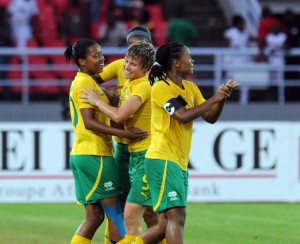 South Africa’s women’s national team recorded its most important victory ever on November 7 by defeating Nigeria 1-0 in the semifinal of the 8th African Women’s Football Championship in Bata, Equatorial Guinea. Defender Janine Van Wyk long-range blast gave Banyana Banyana (The Girls) their first-ever win against the six-time champion Super Falcons. South Africa will face Equatorial Guinea in the final on Sunday, November 11, a team that beat them 1-0 in the first group stage match.
South Africa’s women’s national team recorded its most important victory ever on November 7 by defeating Nigeria 1-0 in the semifinal of the 8th African Women’s Football Championship in Bata, Equatorial Guinea. Defender Janine Van Wyk long-range blast gave Banyana Banyana (The Girls) their first-ever win against the six-time champion Super Falcons. South Africa will face Equatorial Guinea in the final on Sunday, November 11, a team that beat them 1-0 in the first group stage match.
“I have been in the Banyana Banyana side since 2004 and we have tried for so long to beat the Nigerians but luck has never been on our side, but now we have proved that we can compete and beat of the best on the continent,” said Van Wyk. “At the CAF African Championship held in South Africa in 2010 I scored with a free kick from 35 metres out against Nigeria, and my teammates always remind me that I normally reserve my best for matches against Nigeria,” she laughed.
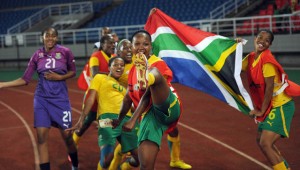 With the men’s team — Bafana Bafana — struggling, it is perhaps not surprising that South African fans and the football establishment are leaping onto the Banyana bandwagon. Following the win against Nigeria, SAFA President Kirsten Nematandani announced he would be flying out to attend the final. “The victory should open doors for the growth of women’s soccer,” he said. “Well done to the girls for making the country proud.”
With the men’s team — Bafana Bafana — struggling, it is perhaps not surprising that South African fans and the football establishment are leaping onto the Banyana bandwagon. Following the win against Nigeria, SAFA President Kirsten Nematandani announced he would be flying out to attend the final. “The victory should open doors for the growth of women’s soccer,” he said. “Well done to the girls for making the country proud.”
“We are in a very positive frame of mind going into the final game against the hosts,” said Joseph Mkhonza, the Banyana head coach. “But we are still focused on attaining our mission of taking gold in this tournament. We came here with a mission and that mission is still on track,” he said. “We have some homework to do before Sunday’s final, knowing we will play in front of a large red-clad crowd in what is certain to be a packed Malabo stadium, but we will be ready for the challenge.”
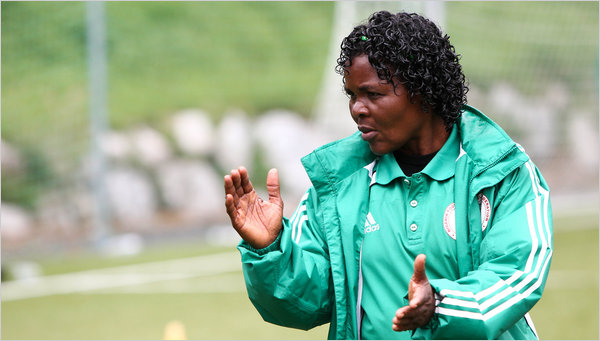
The New York Times today has a piece by Jere Longman about homophobia in the Nigerian team about to play in the 2011 Women’s World Cup. While it’s nice to see the newspaper of record in the U.S. paying attention to the women’s game and to African women in particular, the overall thrust of the article is that homophobia is an example of the “cultural obstacles that remain for many African women who play soccer.”
The story focuses on a single character: head coach Eucharia Uche. A former player and fervent evangelical Christian, Uche claims to have “used religion in an attempt to rid her team of homosexual behavior,” describing the latter as a “dirty issue,” and “spiritually, morally very wrong.”
There are several problems with the article, but I’ll focus on two key ones: (1) blaming “culture,” and (2) African “exceptionalism.” Let’s tackle the first one. While “cultural inhibitions are still cited as inhibitions to girls playing” notes Martha Saavedra’s seminal 2003 overview of the African women’s game published in Soccer and Society, “the general economic troubles and the lack of resources overall is still perhaps the most serious hindrance. Even the bans on women’s football in Northern Nigeria may be indirectly linked to this.” Yes, cultural conservatism (not “culture”) is a factor in some areas, but this does not necessarily apply to all of Nigeria, let alone all of “Africa” as the article’s headline suggests.
This reductionism leads to my second point: African exceptionalism. The first thirteen paragraphs of the article create the impression that homophobia is a singularly “African” issue. It is only in the 14th paragraph that some de-exoticization finally takes place: “The treatment of lesbians in sport is not a matter restricted to women in Africa. Some women on previous United States national soccer teams have been reluctant to live openly gay lifestyles for fear of repercussions.” Surely, American readers of the Times would have been quite interested to learn more about the existence of a “culture” of silence and repression in elite U.S. soccer. It might even invite a comparison with the grim situation in Uche’s squad.
The lack of discussion about women’s football in Nigeria is puzzling as well. The article contains not a single reference to the rich history of the game in Africa’s most populous nation. As I write in African Soccerscapes, women in Nigeria were playing as early as 1943. The 20 October 1943 issue of the Nigerian Spokesman newspaper ran this story:
In response to the demand of the people of Onitsha, the Sierra Leonean friendly Society has started to make arrangements for the replay of the ladies’ football mach which so thrilled the township recently. Good news for football enthusiasts . . . It was the first of its kind to be staged in Onitsha.” Fine show but not up to the standard of boys soccer. “It seemed odd to some to see our women in shorts kicking a football about the field, or clashing with one another after the manner of men . . . but the game itself, when it came to be played, exploded all the fantastic theories some malevolent individuals had concocted about it, and it was a colossal success both in the fun that it provided and on the financial side of it.
By 1960 (Nigeria’s independence) there were women’s teams in Jos, Lagos, Calabar, Onitsha, Kanu, Enugu and other towns. By 1989 there were 28 women’s clubs active, as well as a Nigerian Female Football Organizers Association. This history is vital to gaining a sharper understanding of the Super Falcons’ continental dominance since they first represented Africa at the WWC in 1991.
Let’s hope that future U.S. media coverage of the 2011 WWC will be more informed and more tightly focused on the game itself. The fans deserve it. The players deserve it. Football deserves it.
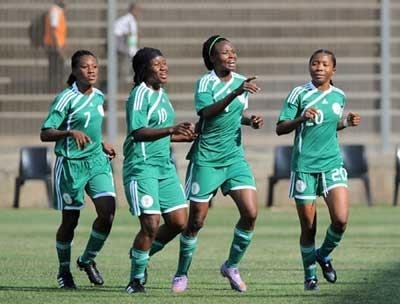
Nigeria 4, Equatorial Guinea 2. The Super Falcons are champions of Africa. The United Nations of Equatorial Guinea put up a good fight, but could not defend their title. Nigeria’s goals came from omniescent Perpetua Nkwocha and Ugochi Oparanozie, and from two own goals — one of them by Carolina, who also headed both of Equatorial Guinea’s goals.
It was 1-1 going into the final 15 minutes, but Nigeria got the job done when it mattered most. Oparanozie’s header made it 2-1 in the 76th minute and just three minutes later an own goal header by Noah Nkein put Nigeria ahead 3-1. Jade pulled one back in the 82nd before Carolina knocked the ball into her own net two minutes later. When the final whistle blew it was nice to see the 15,000 fans applauding the Super Falcons.
Perpetua Nkwocha won the Golden Boot (11 goals) and Stella Mbachu was awarded the Golden Ball for best player of the tournament. In the end, Nigeria dominated the African Women’s Championship and fully deserved their sixth continental crown in seven tries.
I enjoyed following the tournament and watching matches on TV. The women’s game in Africa is clearly progressing technically, tactically and physically. But much more needs to be done at the grassroots level in every country. Long-term growth and sustainable development require greater media attention and sponsorships, as well as support from male-dominated football associations and access to formal training from a young age. Until these components are put into place, expect Nigeria’s dynasty in African women’s football to continue long into the future.
Heartbreak for South Africa
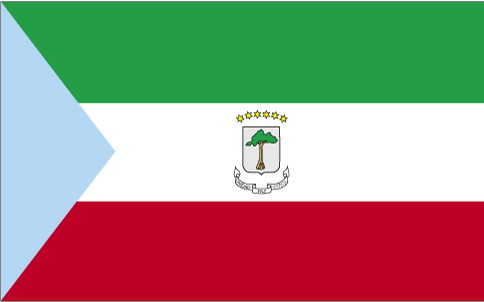
The biggest day in South African women’s football history ended in heartbreak as Equatorial Guinea defeated Banyana Banyana 3-1 after extra time on Thursday at a packed Sinaba stadium in Daveyton outside Johannesburg. After 90 minutes the score was 0-0.
The decisive moment came in the 103rd minute. Salimata Simpore capitalized on a defensive mistake by Van Wyk with a simple finish from just inside the box to give the defending champions a 1-0 lead they did not relinquish.
Psychologically shaken and physically tired, the hosts collapsed. In the 109th minute, a Banyana corner led to a breakaway by Equatorial Guinea that ended with a Jade cross being clumsily deflected by Dludlu inside the far post for an own goal that put the game away. As the deflated home crowd filed out of the stadium, Salimata collected a cross, and in one smooth move faked out a Banyana defender and the goalkeeper to slot home a third goal. Amanda Dlamini saved South Africa’s honor with a delicate chip over the keeper two minutes from time. Final score: 3-1 Equatorial Guinea.
The game had started with the defending champions in control, a fact reflected in their 60 per cent possession of the ball in the first twenty minutes. But the first chance fell to South Africa in the 14th minute when in-form striker Amanda Dlamini squandered the easiest of chances, shooting right at the goalkeeper from close range. Banyana gained confidence and territory in the latter part of the first half, largely thanks to Jafta’s domination of the midfield. Just before the break, Van Wyk’s free kick missile from 40 meters out (!) was tipped over the bar by Miriam. On the ensuing corner, Jafta turned and struck a wonderful shot from near the penalty spot, which forced a miraculous diving save from the Equatorial Guinea keeper. No score after a bruising first half. South Africa would come to rue the missed chances.
The second half was more guarded, neither side wanting to risk making a costly mistake. The Togolese referee seemed far too tolerant of rough tackling, with several players on both sides suffering injuries that required bandaging of heads as well as “holy water” treatment. Despite notching 56 percent of possession, Banyana were unable to penetrate, or seriously threaten the Equatorial Guinea defense anchored by Carolina. Then a turning point in the match: Augustine Makalakalane, South Africa’s coach, replaced Jafta with Makhabane, hoping to gain in creativity and attacking force. Instead the move backfired as Equatorial Guinea asserted control of the midfield. The best chances in the final twenty minutes fell to Chinasa Okoro and Salimata, with goalkeeper Mndaweni doing well to stop them in one-on-one situations.
Dlamini almost won it for South Africa on the stroke of 90 minutes with a high shot to the near post that Miriam parried away for a corner. As we readied ourselves for extra time, Salimata broke away from her marker down the right side but failed to deliver an easy pass to Chinasa for the simplest of tap-in goals. It was a sign of things to come.
Earlier in the day, news reports in South Africa had criticized Equatorial Guinea for quickly giving citizenship to players from Brazil, Cameroon, Ivory Coast, Nigeria, and Senegal. According to kickoff.com, Salimata even played in the AWC qualifiers for Ivory Coast! Cameroon lodged an official protest about Salimata in the group stage, but CAF appears uninterested in pursuing the case.
So Equatorial Guinea and Nigeria — 5-1 winners over Cameroon in the other semifinal — will represent Africa at 2011 Women’s World Cup in Germany. The African champion will be determined on Sunday.
Can Anyone Stop Nigeria?
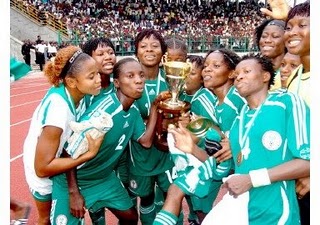
Three victories by a combined score of 10-1 so far in the 2010 African Women’s Championship make Nigeria’s Super Falcons heavy favorites to claim the continental crown.
Led by superstar striker Perpetua Nkwocha’s seven goals, the Super Falcons face Cameroon in tomorrow’s first semifinal. (This match kicks off at 10am. Brunch at Sinaba stadium anyone?). These two West African rivals — in men’s and women’s football — have met in each of the last three AWC tournaments, with Cameroon losing three times (once on penalties) and drawing once. In the 2004 final in South Africa, Cameroon were humiliated by Nigeria 5-0, with Nkwocha scoring four goals. Not a good omen for The Indomitable Lionesses.
South Africa and Equatorial Guinea meet in the second semifinal (3:30pm start, thankfully). This is a rematch of the 2008 title game won by the small oil-rich nation by a score of 2-1. Neither team has played their best football yet so this is likely going to be a riveting contest. Local media have been giving Banyana Banyana unprecedented coverage. The sportive nationalism of the crowds at Sinaba stadium has boosted the confidence, if not the performance, of the South Africans and may well prove decisive against the defending champions.
Prediction: South Africa and Nigeria meet in the final on Sunday.
Nigeria 2, South Africa 1
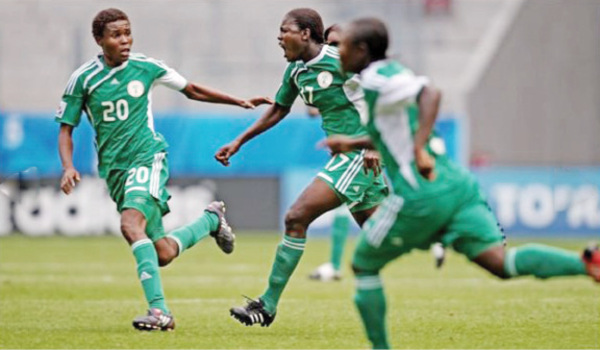
Perpetua Nwkocha was at her stellar best today, scoring two goals as Nigeria defeated South Africa 2-1 at Sinaba Stadium near Johannesburg. The three-time MVP of African Women’s Championships leads the tournament in scoring with five goals in two matches.
The contest was played in a relaxed atmosphere, nothing like the Battle of Vosloruus of 2000. The 15,000 capacity crowd — mostly young men — transformed the ground into a sea of yellow and gold. A small, vociferous group of Nigerian fans countered the vuvuzela cacophony with actual trumpets and drumming.
Banyana started tentatively, but hardly seemed a “desperate team,” as the Nigerian coach said in a pre-game interview. South African goalkeeper Thoko Mndaweni fumbled an easy shot six minutes in, and then failed to come out on a dangerous cross. The Super Falcons moved well on attack, dominating the middle of the park and exploiting their superior speed on the flanks.
Nigeria were rewarded in the 23rd minute, as Nwkocha smoothly finished a 1-on-1, courtesy of an Oji assist and lax marking. Nigeria continued to pile on the pressure, picking up corners and creating chances from their wing play.
Nwkocha made it 2-0 with a towering header off a corner in the 39th minute. Even the home crowd applauded the goal. Five minutes later, Banyana’s central defender Janine Van Wyk struck a thunderous free kick from 30 meters out to bring South Africa back into the game. The wonderful goal revived Banyana and the hopes of the partisan crowd. 2-1 at the halftime break.
I should note that Super Sport’s TV coverage was very good overall. Several cameras provided different angles, though not as many as in PSL (men’s pro) matches. The commentators were fairly solid. They showed respect for Nigeria, avoided condescending remarks, and relied on patriotic verve only a few times. A good sign for women’s football in South Africa and Africa.
As play resumed, South Africa discarded their long-ball approach but strikers Matlou and Popela remained too isolated and, therefore, ineffective.
Nigeria produced the first goalscoring chance of the second half in the 50th minute, before Banyana began to push the visitors back into their defensive half.
But the final twenty minutes saw Nigeria back in control as fatigue slowed Banyana down. The hosts created a last opportunity from a loose ball in the box in the 79th minute, but Nigeria calmly thwarted it. The Super Falcons came close to a third goal in added time and in the end deserved to take all three points from this entertaining and well-played match.